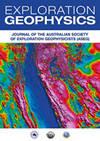Complex structure reconstruction using segmented random sampling and combined dictionary
IF 0.8
4区 地球科学
Q4 GEOCHEMISTRY & GEOPHYSICS
引用次数: 0
Abstract
The reconstruction of data is a critical preliminary work in the seismic data processing. Compressed sensing (CS) has been well applied in the field of reconstruction. The key point of CS is random sampling, which converts the mutual interference alias caused by regular undersampling into lower-amplitude outside noise. But traditional sampling methods lack constraints on sampling points, emerging too much alias. Segmented random sampling (SRS) effectively controls the distance between sampling points. On the other hand, a single mathematical transformation will lead to incomplete sparse expression and bad restoration effects. Morphological component analysis (MCA) decomposes a signal into several components with outstanding morphological features to approximate the complex internal structure of data. In this paper, we found a new dictionary combination (shearlet + DCT) under the MCA framework and used the block coordinate relaxation algorithm to get the optimal solution to obtain reconstruction results. Tests of 2D data and 3D data have proved that the proposed method can get a better effect when reconstructing the SRS data.基于分段随机抽样和组合字典的复杂结构重构
数据重建是地震数据处理中一项重要的前期工作。压缩传感(CS)在重建领域得到了很好的应用。CS的关键是随机采样,它将规则欠采样引起的相互干扰混叠转换为较低幅度的外部噪声。但传统的采样方法缺乏对采样点的约束,出现了过多的别名。分段随机采样(SRS)有效地控制了采样点之间的距离。另一方面,单一的数学变换会导致稀疏表达式不完整,恢复效果不好。形态成分分析(MCA)将信号分解为几个具有突出形态特征的成分,以近似数据的复杂内部结构。在这篇论文中,我们发现了一种新的词典组合(shearlet + DCT),并使用块坐标松弛算法得到最优解以获得重建结果。通过对二维数据和三维数据的测试,证明了该方法在重构SRS数据时能取得较好的效果。
本文章由计算机程序翻译,如有差异,请以英文原文为准。
求助全文
约1分钟内获得全文
求助全文
来源期刊

Exploration Geophysics
地学-地球化学与地球物理
CiteScore
2.30
自引率
0.00%
发文量
33
审稿时长
>12 weeks
期刊介绍:
Exploration Geophysics is published on behalf of the Australian Society of Exploration Geophysicists (ASEG), Society of Exploration Geophysics of Japan (SEGJ), and Korean Society of Earth and Exploration Geophysicists (KSEG).
The journal presents significant case histories, advances in data interpretation, and theoretical developments resulting from original research in exploration and applied geophysics. Papers that may have implications for field practice in Australia, even if they report work from other continents, will be welcome. ´Exploration and applied geophysics´ will be interpreted broadly by the editors, so that geotechnical and environmental studies are by no means precluded.
Papers are expected to be of a high standard. Exploration Geophysics uses an international pool of reviewers drawn from industry and academic authorities as selected by the editorial panel.
The journal provides a common meeting ground for geophysicists active in either field studies or basic research.
 求助内容:
求助内容: 应助结果提醒方式:
应助结果提醒方式:


